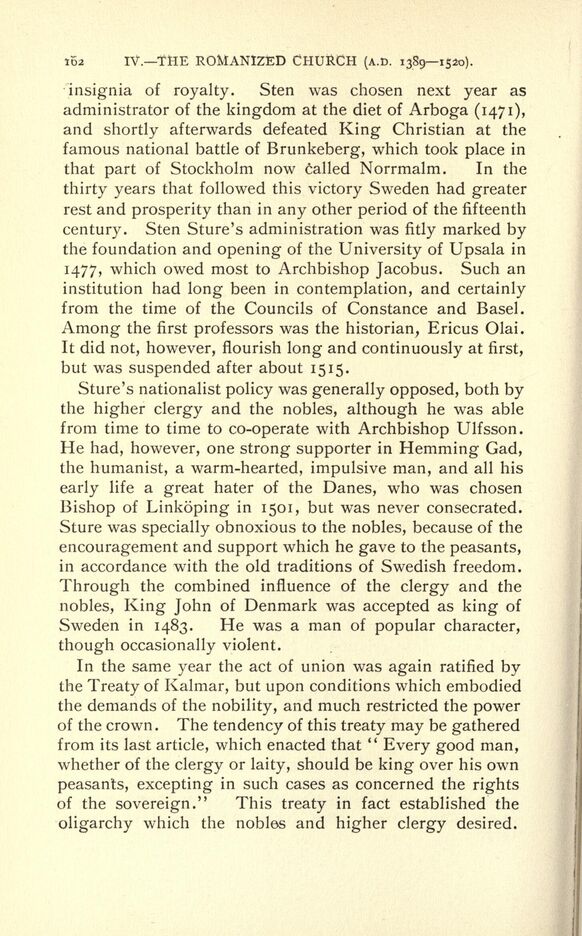
Full resolution (JPEG) - On this page / på denna sida - IV. The Romanized Church under the Union Sovereigns (1389—1520 A.D.)

<< prev. page << föreg. sida << >> nästa sida >> next page >>
Below is the raw OCR text
from the above scanned image.
Do you see an error? Proofread the page now!
Här nedan syns maskintolkade texten från faksimilbilden ovan.
Ser du något fel? Korrekturläs sidan nu!
This page has never been proofread. / Denna sida har aldrig korrekturlästs.
102 IV. THE ROMANIZED CHURCH (A.t. 13891510).
insignia of royalty. Sten was chosen next year as
administrator of the kingdom at the diet of Arboga (1471),
and shortly afterwards defeated King Christian at the
famous national battle of Brunkeberg, which took place in
that part of Stockholm now called Norrmalm. In the
thirty years that followed this victory Sweden had greater
rest and prosperity than in any other period of the fifteenth
century. Sten Sture s administration was fitly marked by
the foundation and opening of the University of Upsala in
1477, which owed most to Archbishop Jacobus. Such an
institution had long been in contemplation, and certainly
from the time of the Councils of Constance and Basel.
Among the first professors was the historian, Ericus Olai.
It did not, however, flourish long and continuously at first,
but was suspended after about 1515.
Sture s nationalist policy was generally opposed, both by
the higher clergy and the nobles, although he was able
from time to time to co-operate with Archbishop Ulfsson.
He had, however, one strong supporter in Hemming Gad,
the humanist, a warm-hearted, impulsive man, and all his
early life a great hater of the Danes, who was chosen
Bishop of Linkoping in 1501, but was never consecrated.
Sture was specially obnoxious to the nobles, because of the
encouragement and support which he gave to the peasants,
in accordance with the old traditions of Swedish freedom.
Through the combined influence of the clergy and the
nobles, King John of Denmark was accepted as king of
Sweden in 1483. He was a man of popular character,
though occasionally violent.
In the same year the act of union was again ratified by
the Treaty of Kalmar, but upon conditions which embodied
the demands of the nobility, and much restricted the power
of the crown. The tendency of this treaty may be gathered
from its last article, which enacted that
"
Every good man,
whether of the clergy or laity, should be king over his own
peasants, excepting in such cases as concerned the rights
of the sovereign." This treaty in fact established the
oligarchy which the nobles and higher clergy desired.
<< prev. page << föreg. sida << >> nästa sida >> next page >>